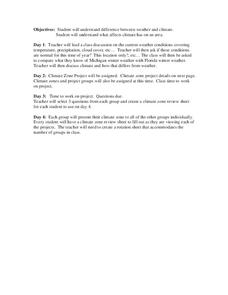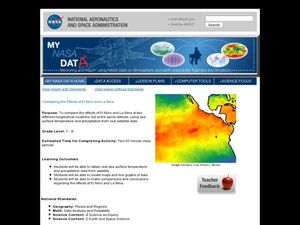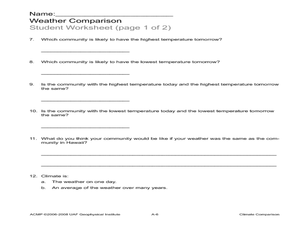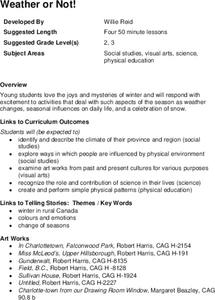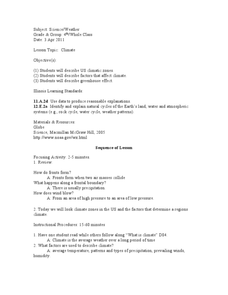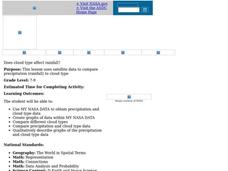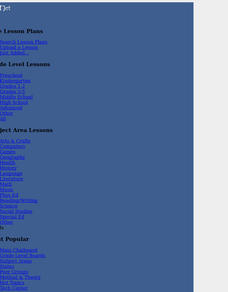PBS
The Landscape of the Pacific Northwest
The Pacific Northwest includes four mountain ranges and one rain forest. Explore the breathtaking scenery using a lesson from a larger series from PBS covering climate and weather. Starting with photographs taken from the international...
Curated OER
Weather Versus Climate
Students differentiate weather and climate. In this earth science lesson, students investigate the climate of a zone they chose. They create a presentation and share their findings with the class.
Curated OER
Weather, Climate and Atmospheric Process
Students explore Earth science by completing a could identification activity. In this weather lesson plan, students discuss the different forms of measurement for the weather of Earth. Students discuss global warming and examine a list...
Curated OER
Utah Weather
Fourth graders diagram the weather in Utah through the use of a glyph. In this Utah weather lesson, 4th graders create weather glyphs of different areas in the state. Students answer questions about the weather and then compare their...
Curated OER
Climate Change in Canada
In this Canada worksheet, students read a 6 page detailed informational text about climate change in Canada. Students then complete 10 essay/short answer questions.
Curated OER
Eyewitnesses to Change
Students explore recent changes in the Artic's climate that have been observed by Artic residents. They watch videos, take notes and create a concept map. They also look at historical weather data from a specific Artic community. The...
Chicago Botanic Garden
Plant Phenology Data Analysis
Beginning in 1851, Thoreau recorded the dates of the first spring blooms in Concord, and this data is helping scientists analyze climate change! The culminating instructional activity in the series of four has pupils graph and analyze...
Chicago Botanic Garden
Are Global CO2 Levels Changing?
According to the Mauna Loa observatory, carbon dioxide levels increased by 3 ppm in our atmosphere between 2015–2016. Individuals analyze carbon dioxide data from around the world and then share this with a home group in...
Curated OER
Comparing the Effects of El Nino and La Nina
Students examine the differences between an El Nino and La Nina year. In this investigative lesson students create maps and graphs of the data they obtained.
Curated OER
What is Climate?
In this weather worksheet, students read a brief excerpt that compares the various types of climates found on Earth. Then they explain where the low- and high-pressure systems follow each other throughout the year.
Curated OER
Comparing Temperature, Pressure, and Humidity
Young scholars investigate data on temperature, pressure, and humidity by downloading information from the ARM Website. Working in groups, they discover how weather impacts life in each of the ARM sites. They record weather data in their...
Curated OER
Climate Types
In this weather worksheet, students describe the rainfall distribution found in two different areas of the world. Then they compare the various types of climates found around the world using the graphs shown on the sheet.
Curated OER
Climate Comparison
Students explore climate regions. In this climate activity, students examine the climate regions of Alaska as well as the state of Hawaii. Students research selected Internet sources to gather information regarding the climates present...
Curated OER
Weather Olympics
Students consider the effects of topography on climate patterns. In this earth science lesson, students research weather patterns and make inferences of how the land forms may create different climates. Students compare Celsius...
Curated OER
Weather or Not!
Students are introduced to the different climate regions of Canada. In groups, they discuss ways in which people are affected by the weather and how it limits their outdoor activities. They use artwork by Robert Harris to predict what...
Curated OER
Our Eye in the Sky: The TIROS Weather Satellite
Young scholars investigate the political context of the creation of a weather satellite. In this technology and society instructional activity, students explore the historical, technological, and political context of the TIROS weather...
Curated OER
Beautiful Bovine
Looking for a fun and interactive way to explore bovine biology? Learners read a brief informational text (included for printing) before participating in several cross-curricular activities. First, grab their attention with a hilarious...
Curated OER
Too Heavy For Me
Students explore the different arrangement of air molecules in high and low air pressure masses. They compare the temperature of high and low pressure masses and discover how a barometer works.
NASA
Freshwater Availability Classroom Activity
This science assignment produced by NASA teaches inquiring minds the distribution of Earth's water. Learners will appreciate and understand the importance of fresh water and how weather and climate affects everything.
Curated OER
Climate
Young scholars make and record observations about local weather. They write about their favorite kind of weather and what it would be like to live in a climate of their choice. They take a quiz on regional U.S. climates.
Curated OER
Studying Snow and Ice Changes
High schoolers compare the change in snow and ice over a 10 year period. In this environmental science lesson, students use the live data on the NASA site to study and compare the monthly snow and ice amounts on a map of the entire...
Curated OER
Does Cloud Type Affect Rainfall?
Student uses MY NASA DATA to obtain precipitation and cloud type data. They create graphs of data within MY NASA DATA. They compare different cloud types as well as precipitation types. They describe graphs of the precipitation and cloud...
Curated OER
Oceans and Weather
Students analyze the impact the ocean and its currents have on weather. In this oceans and weather instructional activity, students analyze data comparing inland and coastal weather, and analyze satellite data for evidence of El Nino.
Curated OER
Africa's Climatic Regions
Learners are introduced to the different climates and vegetation of Africa, and compare them to similar climatic regions found in the United States.



